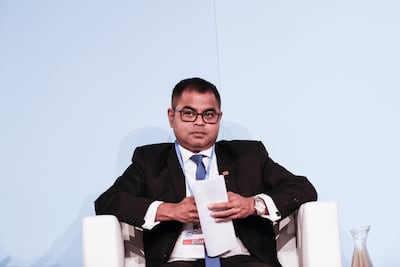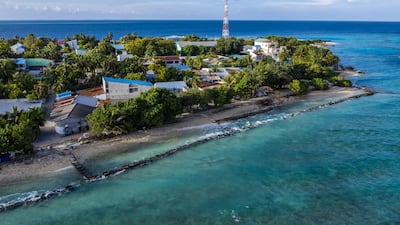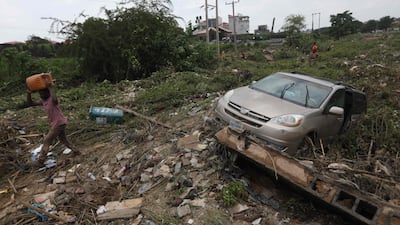Much faster access to loss and damage funds is vital to help the Maldives turn the tide on climate change, the country’s environment minister has said.
Thoriq Ibrahim, Minister of Climate Change, Environment and Energy, said the loss and damage fund was the most crucial outcome for his country from Cop28 that was held in the UAE last year.
Speaking on the sidelines of the Global Sustainability Forum in Abu Dhabi on Monday, Mr Ibrahim said it was now vital that “historical emitters” and “developed countries” stepped up and ensured funds were provided and could be accessed swiftly by those who needed it the most.
“The most important thing that happened at Cop28 was the loss and damage fund becoming operational,” Mr Ibrahim told The National, at the event hosted by Adnoc, the CSO Network and the New York Stock Exchange, where experts discussed sustainable technologies, data and the role of artificial intelligence in climate and nature.
“The funds should come from the developed countries and the historical emitters,” he said, and they should be “easy to access”.
There was little point in applying and having to wait for years, he said, as “more damage” is then done.

Helping victims of climate crisis
The loss and damage fund aims to help the most vulnerable countries deal with the worst effects of climate change. But countries have long argued over the facility with wealthier countries believing it could be viewed as climate reparations.
By the end of Cop28 pledges had reached $792 million but experts believe trillions of dollars will be needed to deal with climate change generally.
Small island developing states, such as the Maldives, emit about 1 per cent of global greenhouse gas emissions but they often hardest hit and have the least capacity to deal with it.
“We have not done anything that has accelerated the impact of climate change because our emissions [are] minuscule,” said Mr Ibrahim. “But we face the effects of climate change every day.”
The Maldives is an archipelago in the Indian Ocean made up of about 1,200 islands, most of them uninhabited. It is known for its idyllic white-sand beaches and palm-fringed atolls, with tourism accounting for about a third of the economy, according to the World Bank.
But scientists warn it could face a tough future because of man-made climate change particularly because of rising seas. About 80 per cent of the Maldives is less than a metre above mean sea levels.
The UN's Intergovernmental Panel on Climate Change has cautioned global sea levels could rise by about half a metre by 2100 even if greenhouse gas emissions are reduced or rise up to a metre if emissions continue to rise sharply. The UN has repeatedly said the world is way off track in curbing warming emissions. In 2009, the Maldives cabinet even held a meeting underwater to highlight the issue of rising seas.
Coastal erosion, heatwaves, saltwater contamination of its vital freshwater drinking supplies and extreme weather events are also imperilling the Maldives, making its population of about 544,000 vulnerable.
Facing an uncertain future
Mr Ibrahim said weather patterns are changing, bringing more drought and, when it rains, the downpours are much more intense.
“There is flooding [with] high tidal waves. And there's a lot of coastal erosion happening,” he said.
“There are islands that are in severe condition as far as erosion is concerned,” he said. “In some islands, the erosion has gone up to their home.”
Maldives has ramped up land reclamation and built sea walls – known as adaptation – to try to deal with climate change. The government is now also using desalination to provide drinking water for many islanders.
Mr Ibrahim, however, dismissed any idea that the administration would try to relocate people.
“There are cases where if there is severe erosion that people may move from one island to the other but we have no intention of moving out of the Maldives.”
He said the small island states were on the front lines now but if the situation was not tackled, everywhere would face problems.
“If they protect the small islands from the effects of climate change, then the rest of the world will be saved.”
Cop29, meanwhile, takes place in Azerbaijan this November. It is expected that finance will feature prominently and Mr Ibrahim said this was crucial as they knew how to tackle climate change but needed the money to do it.
“I'm hopeful about the future,” he said. “We have lived in the Maldives for 4,000 years.
“We have the blueprint. The only thing is the finance.”













